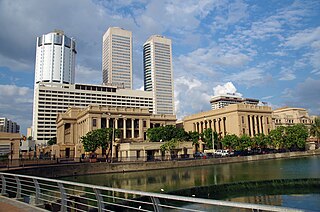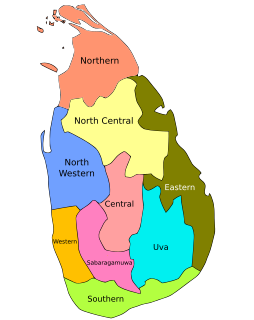Related Research Articles

The Liberation Tigers of Tamil Eelam (LTTE) was a Tamil militant organization that was based in northeastern Sri Lanka. Its aim was to secure an independent state of Tamil Eelam in the north and east in response to the state policies of successive Sri Lankan governments that were widely considered to be discriminatory towards the minority Sri Lankan Tamils, as well as the oppressive actions—including anti-Tamil pogroms in 1956 and 1958—carried out by the majority Sinhalese.

Sri Lanka, formerly known as Ceylon, and officially the Democratic Socialist Republic of Sri Lanka, is an island country in South Asia. It is situated on the Indian Ocean, southwest of the Bay of Bengal, and southeast of the Arabian Sea; while being separated from the Indian subcontinent by the Gulf of Mannar and the Palk Strait. Sri Jayawardenepura Kotte is its legislative capital, and Colombo is its largest city and financial centre.
Sinhalese people, historically known as Hela people are an Indo-Aryan ethnic group of the island of Sri Lanka. They constitute about 75% of the Sri Lankan population and number greater than 16.2 million. The Sinhalese identity is based on language, cultural heritage and nationality. The Sinhalese people speak Sinhala, an insular Indo-Aryan language, and are predominantly Theravada Buddhists, although a minority of Sinhalese follow branches of Christianity and other religions. Since 1815, they were broadly divided into two respective groups: The 'Up-country Sinhalese' in the central mountainous regions, and the 'Low-country Sinhalese' in the coastal regions; although both groups speak the same language, they are distinguished as they observe different cultural customs. According to the 5th-century epic poem Mahavamsa and the Dipavamsa, a 3rd–5th century treatise written in Pali by Buddhist monks of the Anuradhapura Maha Viharaya in Sri Lanka, the Sinhalese descend from the Indo-Aryan settlers who came to the island in 543 BCE from Sinhapura, in India, led by Prince Vijaya.

Colombo is the commercial capital and largest city of Sri Lanka by population. According to the Brookings Institution, Colombo metropolitan area has a population of 5.6 million, and 752,993 in the city proper. It is the financial centre of the island and a tourist destination. It is located on the west coast of the island and adjacent to the Greater Colombo area which includes Sri Jayawardenepura Kotte, the legislative capital of Sri Lanka and Dehiwala-Mount Lavinia. Colombo is often referred to as the capital since Sri Jayawardenepura Kotte is itself within the urban/suburban area of Colombo. It is also the administrative capital of the Western Province and the district capital of Colombo District. Colombo is a busy and vibrant city with a mixture of modern life, colonial buildings and monuments.

The Sri Lankan Civil War was a civil war fought in Sri Lanka from 1983 to 2009. Beginning on 23 July 1983, there was an intermittent insurgency against the government by the Velupillai Prabhakaran led Liberation Tigers of Tamil Eelam. The LTTE fought to create an independent Tamil state called Tamil Eelam in the north-east of the island, due to the continuous discrimination and violent persecution against Sri Lankan Tamils by the Sinhalese dominated Sri Lankan Government.

The Sri Lanka national men's cricket team, nicknamed The Lions, represents Sri Lanka in men's international cricket. It is a Full Member of the International Cricket Council (ICC) with Test, One-Day International (ODI) and T20 International (T20I) status. The team first played international cricket in 1926–27, and were later awarded Test status in 1981, which made Sri Lanka the eighth Test cricket playing nation. The team is administered by Sri Lanka Cricket.

Velupillai Prabhakaran was a Sri Lankan Tamil guerrilla and the founder and leader of the Liberation Tigers of Tamil Eelam (LTTE), a militant organization that sought to create an independent Tamil state in the north and east of Sri Lanka. The LTTE waged war in Sri Lanka for more than 25 years, to create an independent state for the Sri Lankan Tamil people.
SriLankan Airlines is the flag carrier of Sri Lanka and a member airline of the Oneworld airline alliance. It is currently the largest airline in Sri Lanka by number of aircraft and destinations and was launched in 1979 as Air Lanka following the termination of operations of the original Sri Lankan flag carrier Air Ceylon. Following its partial acquisition in 1998 by Emirates, it was re-branded and the current livery was introduced. In 2008, the government of Sri Lanka acquired all the shares of the airline from Emirates. After ending the Emirates partnership, it retained its re-branded name and logo. SriLankan Airlines operates over 560 flights per week across Asia.

Percy Mahinda Rajapaksa, commonly known as Mahinda Rajapaksa, is the Prime Minister of Sri Lanka and Minister of Finance since 2019, and previously from 2004 to 2005. He served as President of Sri Lanka from 2005 to 2015 and as Leader of the Opposition from 2002 to 2004 and 2018 to 2019. He has been the Member of Parliament (MP) for Kurunegala since 2015.

In Sri Lanka, provinces are the first level administrative division. They were first established by the British rulers of Ceylon in 1833. Over the next century most of the administrative functions were transferred to the districts, the second level administrative division. By the middle of the 20th century the provinces had become merely ceremonial. This changed in 1987 when, following several decades of increasing demand for a decentralization, the 13th Amendment to the 1978 Constitution of Sri Lanka established provincial councils. Currently there are nine provinces.

The Sri Lanka national football team represents Sri Lanka in association football and is controlled by the Football Sri Lanka, the governing body of football in Sri Lanka. Sri Lanka's home grounds are Colombo Racecourse, Sugathadasa Stadium and Kalutara Stadium. The Sri Lankan team was known as the Ceylon national football team until 1972 when Ceylon was renamed Sri Lanka.

UTC+05:30 is an identifier for a time offset from UTC of +05:30. This time is used in India and Sri Lanka, and was formerly used in Nepal. It is five and a half hours ahead of Coordinated Universal Time. Around 1.4 billion people live inside this time zone, making it the second most populous after UTC+08:00.

In Sri Lanka, districts are the second-level administrative divisions, and are included in a province. There are 25 districts organized into 9 provinces. Each district is administered under a district secretary, who is appointed by the central government. The main tasks of the district secretariat involve coordinating communications and activities of the central government and divisional secretariats. The district secretariat is also responsible for implementing and monitoring development projects at the district level and assisting lower-level subdivisions in their activities, as well as revenue collection and coordination of elections in the district. A district is divided into a number of Divisional Secretary's Divisions, which are in turn subdivided into 14,022 grama niladhari divisions. There are 331 DS divisions in the country.

Sri Lankan Tamils, also known as Eelam Tamils, Ceylon Tamils, or simply Tamils, are members of the Tamil ethnic group native to the South Asian island state of Sri Lanka. Today, they constitute a majority in the Northern Province, live in significant numbers in the Eastern Province and are in the minority throughout the rest of the country. 70% of Sri Lankan Tamils in Sri Lanka live in the Northern and Eastern provinces.

Sri Lankan Moors are an ethnic minority group in Sri Lanka, comprising 9.2% of the country's total population. They are mainly native speakers of the Tamil language with influence of Arabic words. They are predominantly followers of Islam. The Sri Lankan Muslim community is divided as Sri Lankan Moors, Indian Moors and Sri Lankan Malays as per their history and traditions.

Tamil Eelam is a proposed independent state that many Tamils in Sri Lanka and the Sri Lankan Tamil diaspora aspire to create in the north and east of Sri Lanka. The name is derived from the ancient Tamil name for Sri Lanka, Eelam. Tamil Eelam, although encompassing the traditional homelands of Sri Lankan Tamils, does not have official status or recognition by world states. Large sections of the North-East were under de facto control of the Liberation Tigers of Tamil Eelam (LTTE) for most of the 1990s–2000s.

Several languages are spoken in Sri Lanka within the Indo-Aryan, Dravidian and Austronesian families. Sri Lanka accords de facto official status to Sinhala and Tamil, and English as a link language. The languages spoken on the island nation are deeply influenced by the various languages in India, Europe and Southeast Asia. Arab settlers and the colonial powers of Portugal, the Netherlands and Britain have also influenced the development of modern languages in Sri Lanka. See below for the most-spoken languages of Sri Lanka.

Films produced in Sri Lanka ordered by the date of release

The Northern Province is one of the nine provinces of Sri Lanka, the first level administrative division of the country. The provinces have existed since the 19th century but did not have any legal status until 1987 when the 13th Amendment to the Constitution of Sri Lanka established provincial councils. Between 1988 and 2006 the province was temporarily merged with the Eastern Province to form the North Eastern Province. The capital of the province is Jaffna. The majority of the Sri Lankan Civil War was played out in this province.
The Indian intervention in the Sri Lankan Civil War was the deployment of the Indian Peace Keeping Force in Sri Lanka intended to perform a peacekeeping role. The deployment followed the Indo-Sri Lankan Accord between India and Sri Lanka of 1987 which was intended to end the Sri Lankan Civil War between militant Sri Lankan Tamil nationalists, principally the Liberation Tigers of Tamil Eelam (LTTE), and the Sri Lankan military.
References
- ↑ "Species Details: Pachyrhabda bacterias Meyrick, 1913". Catalogue of Life. Retrieved 29 May 2018.
- ↑ Koçak, Ahmet Ömer; Kemal, Muhabbet (20 February 2012). "Preliminary list of the Lepidoptera of Sri Lanka". Cesa News. Centre for Entomological Studies Ankara (79): 1–57 – via Academia.